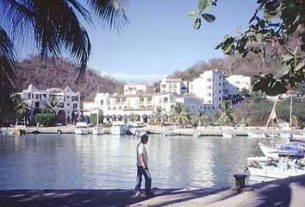A Woman’s Perspective on Living in Mexico
My editor asked me to share with you some of the down sides of living in Mexico. He said, “no one will believe it’s all wonderful.” He’s right of course, but for me, the good far outweighs the bad — unless I’m smack in the middle of it. Then, I’ve been known to lose some perspective.
I’ll share four stories: Prowlers, water heaters, cabling and stolen license plates.
Prowler problems.
An hour ago. My doors are open and the birds are singing, the scent of bougainvilleas wafts in and I’m answering e-mail. Pierre and Maurice (my small white poodles) are barking like crazy. Something is definitely amiss. Nobody is at the front gate. I walk into the backyard that is surrounded by 10-foot cement walls covered with bougainvilleas. There’s a Mexican man standing on my neighbor’s roof and staring at my barking dogs and my house.
I think, well, he’s probably their gardener, so I say “hola” and bring the dogs back inside with severe warnings to hush. Then I get anxious. I walk next door to my neighbor to ask if that’s his gardener on the roof. He says “No, Jose isn’t working today.”
Now, I’m concerned. There have been several robberies lately. I ask my neighbor to come back into my house with me. No man hiding in the closets, no man on the roof. I lock all the doors and one neighbor calls the police.
In three minutes they’re here and I find out that the roof belonged not to my next-door neighbor, but to the house catty-corner. How did I know? In a few minutes, the policeman is back saying it was the gardener of the other neighbor and there is no problem. Case solved.
Now, I sit here writing this article and all my doors are open again. I like the fresh air and a glass of wine does wonders to calm nerves.
Water heater hysteria
One year ago. My bodega caught on fire. A bodega is kind of a tool shed/gardener’s room. Because it’s built of brick and cement, it didn’t burn down. The room was blackened and the plastic dials on the water heater melted. Flames leaping from the water heater had started the fire.
The water heater was new. My contractor had the receipt and the guarantee. I called the contractor. The electrician who had installed the water heater, showed up at my door with the necessary materials to vent the water heater. That means he knew what the problem was before he even looked at the damage. This is a typical Mexican shortcut. Why vent the heater if they can get away without it?
Now I have a vented water heater that has second degree burns. I want a new one. “Why?” the contractor asks. “It works fine.” At least I have hot water again and they did repaint the bodega.
One month later. I need my propane tank refilled. I stop by the gas company and they come out to refill it. Guess where it’s located? On the roof of the bodega. They say “We can’t fill it. It’s too close to the water heater vent. It’ll explode. This is very dangerous. You’ll have to move either the tank or the water heater.”
At this point I have a functional water heater, but no gas to heat the water. My contractor says, “No es mi culpa.” That means it’s not his fault. He says it’s my fault because water heaters are usually not put inside buildings. Of course, I was in California when he made that decision; but to him, this explains everything. So, I hire someone else to move the gas tank so I can get gas to heat the water.
That same electrician/plumber was the one who turned off my water purification system rather than have the bad connection leaking water on my bodega floor (see last month’s article).
Mexican homes simply aren’t built to American or Canadian standards. There are no requisite electrical, plumbing or building inspections.
I had the house rewired last year when I rebuilt it. Since then, most all of the wiring has had to be replaced. They put the wires too close to the recessed lighting so the wiring is continually fried. If this house were built of wood, it would have burned down several times by now. [There is no fire department here; none is needed, they say].
Cabling Catastrophe
I asked to have my Bose speakers installed in the living room — at the beginning of the project. He forgot. So, he put them up one wall and strung the cables across the roof and back down in other parts of the living room. I agreed to let him do this if he promised to protect the roof-top cables from the elements. He assured me three times it was done. Finally, when I climbed up on the roof (scary, with the rickety ladder I used), there they were — laying bare-assed naked across my roof. The cables, that is. The cables still work, but the electricity brown-out fried my Bose receiver. It was still under guarantee, but there are no Bose service centers in Mexico.
At this point, I thought about leaving . . . but didn’t!
Stolen Plates
One day, after serious shopping with two older friends of mine (near seventy), we were trying to find our way out of Guadalajara. The policeman motioned me over to the side and told us to get out of the car. At least, I think that’s what he meant when he made me give him the keys and he opened my door and waved his hand towards the sidewalk. I knew very little Spanish then, and his English was no better.
We were tired and frightened. How would we get home (about an hour’s drive). He showed me there were no plates on my car. And, he wouldn’t give my keys back. I did something I’m not proud of, but was told often worked. I started to cry. A passer-by who could translate stopped and offered to help. It’s a long story, but to make it short, we took a cab to the police station; filed a report stating that the plates had been stolen and three hours later, they issued us a paper which would allow us to drive the car home.
The next morning I was instructed to go to the Chapala police station for a stamp on this paper which would be mounted on my rear window until I had new plates shipped from Nevada. At the station, a local police officer I had seen from Ajijic stepped up and said, “Were your plates from Nevada?”
“Yes,” I said. How did you know?
“We took them when you got a parking ticket last week. We do this with American plates to make sure you pay the fine.”
“And you didn’t tell me?” I asked.
He said, “Follow me to my office in Ajijic and I’ll return your plates.”
I did. He took out the plates from his cupboard and said, ” $250 pesos.”
“But, last month I got a parking ticket just like this one and it was $21 pesos.”
We did this dance for awhile; I paid him $50 pesos for his trouble and paid the $21 pesos at the city hall in Chapala. I hate this mordida (payola) stuff, but it’s a way of life down here and not having the local police upset with you makes good sense.
The moral of this story is to use European screws so they can’t take off your plates!
I think the trick to serenity in Mexico is to understand and appreciate the differences and to go with the flow; or to live life as indicated by the serenity prayer: “God, grant us the serenity to accept things that cannot be changed, the courage to change things that should be, and the wisdom to know the difference.”
I try to focus on the last part — the wisdom to know the difference.


